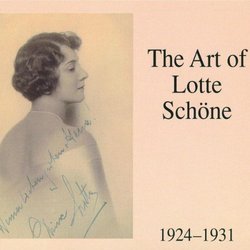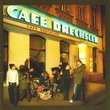| All Artists: Wolfgang Amadeus Mozart, Giacomo Meyerbeer, Johann II [Junior] Strauss, Giacomo Puccini, Carl Zeller, Sidney Jones, Franz von Suppe, Carl Millocker, Josef Strauss, Anton Rubinstein, Gaetano Donizetti, Gioachino Rossini, Otto Nicolai, Franz [Vienna] Schubert, Giuseppe Verdi, Jules Massenet, Fritz Zweig, Erich Orthmann, Erich Ortmann, Leo Blech Title: The Art of Lotte Schöne, 1924-31 Members Wishing: 0 Total Copies: 0 Label: Preiser Records Release Date: 8/20/1996 Genres: Pop, Classical Styles: Vocal Pop, Opera & Classical Vocal, Historical Periods, Classical (c.1770-1830), Modern, 20th, & 21st Century Number of Discs: 2 SwapaCD Credits: 2 UPC: 717281892247 |
Search - Wolfgang Amadeus Mozart, Giacomo Meyerbeer, Johann II [Junior] Strauss :: The Art of Lotte Schöne, 1924-31
 | Wolfgang Amadeus Mozart, Giacomo Meyerbeer, Johann II [Junior] Strauss The Art of Lotte Schöne, 1924-31 Genres: Pop, Classical
|
Larger Image |
CD DetailsSimilar CDs |
CD ReviewsLotte Schöne: A Near Ideal German Lyric Soprano Doug - Haydn Fan | California | 08/10/2009 (5 out of 5 stars) "Ask a devotee of German singing about the lyric soprano Lotte Schöne and you are going to be in for a long enthusiastic response.
Schöne is often sandwiched as a voice and talent somewhere between the coloratura Maria Ivogün and the lyric Elisabeth Schumann. This does her quite an injustice - in many ways she was the beau ideal in many of the lighter, less dramatically involved lyric roles of the operatic stage. Schöne displays a surprising fluency and facility - up to a point - in the acrobatics practiced with such effortless aplomb by Ivogün, if never really challenging or even attempting to challenge such a singer. (I must add - The more I hear the super rarities Ivogün made at the very onset of her career under Bruno Walter in Munich, the more sure I am few of the coloraturas regulary posted as Ivogün's betters can sing as well.) Thus Schöne's 'shortcomings' in not equalling Ivogün are in fact no such thing - unless we are going to concede such 'limitations' to almost every soprano who follows her! Schöne also sings with much of that ineffable and intimate charm so winning in the singing of Schumann. I didn't imagine it possible until hearing for the first time these rare recordings. It's now apparent, given this remarkably wide range of performances, how close Schöne comes to Schumann's depths of feeling, while at the same time Schöne clearly has in addition greater purely techincal resources than the widely beloved Elisabeth Schumann. Schöne, like so many others, suffered a great personal tragedy with the rise of the National Socialists to power in Germany. Jewish artists could no longer appear on the German stages, and she was forced to flee Germany in 1933. Schöne moved to France and sang there with great acclaim starting in 1934. She also sang in her birthplace Vienna. However, the German Anschluss made it impossible for her to continue her career in Austria, and she returned to France. The fall of France forced her to flee Paris for the south of France, where she remained in seclusion throughout the war. By the time the hostilites finally ended, Schöne's career was over. When listening to Lotte Schöne three unforgettable qualities to her singing emerge. First, her voice is nearly perfectly placed for the lighter soprano roles. She uses it evenly and with perfect judgement so long as she is not asked to go either too low, where there is some lack of support and equalization, or too high, where she can handle all but those stratospheric notes that are the special province of only the purest coloraturas. Second, the actual color of Schöne's voice is just right, truly a thing of exquisite beauty - and never too thin, as was sometimes the case with the otherwise wonderful Lucrezia Bori of the Met. Third and last, Schöne always sounds natural and spontaneous in whatever role she sang - a blessing in the artifical world of opera. She may have been the quintessential Viennese, able to toss off operetta numbers from Johann Strauss and company with the best of them, but she also contained within her a suprising, deeply touching pathos, and what makes her so special - this quality is never produced by forcing her voice or through excessive vibrato, reasonable in major dramatic roles, but heavy-handed in most of Schöne's roles. You could not ask for a more perfect Liu in Puccini's Turandot. Presier offers its usual kings ransom of these earliest Lotte Schöne recordings - the first Cd of this set consists entirely of precious acoustic German Odeons. These recordings were made right before the Western Electric System of electrical recording forever replaced Odeon's old horn process. They were issued in minuscule numbers, and in several cases are as scarce as hen's teeth or stardust! Speaking as someone who has collected, to a modest degree, some of these records in their original form, this Preiser set can only leave one speechless with wonder. With the rise of the Third Reich artists such as Schöne were offically banished, their recordings not just withdrawn from the catalogs, but actually destroyed. Owning recordings by Jewish artists, however lovely the singing, was madness - playing a recording of such a well known voice as Schöne invited instant trouble of informers. The fall of Berlin saw the burning of Odeon's factory, and the destruction of its files. Bored Russian troops amused themselves by using the irreplaceable metal masters for target practice. Large and nearly complete Schöne collections simply are not something anyone might ever imagine could exist! We are therefore absolutely in Preiser's debt for such a magnificent offering of so many rarities. The actual price of the Cd set is little more than a pittance against what is presented in both historical and artistic merit - a chance to hear once again this singer who was denied her rightful place in opera by the most evil of governments. Among the samples one might listen first to Schöne singing the well known "Mein Herr Marquis" from "Die Fledermaus". Others have brought more extreme flash to the aria, but Schöne balances to perfection the mixture of elements, gaiety and whismy, wrapped with an understated but delicious Viennese worldiness. Collectors who are not put off by older sound, or singers who essay Italian roles in German, should find these recordings of Schöne full of joy, charm and often most moving singing, singing one can enjoy over time again and again with increasing pleasure. " |

 Track Listings (21) - Disc #1
Track Listings (21) - Disc #1

